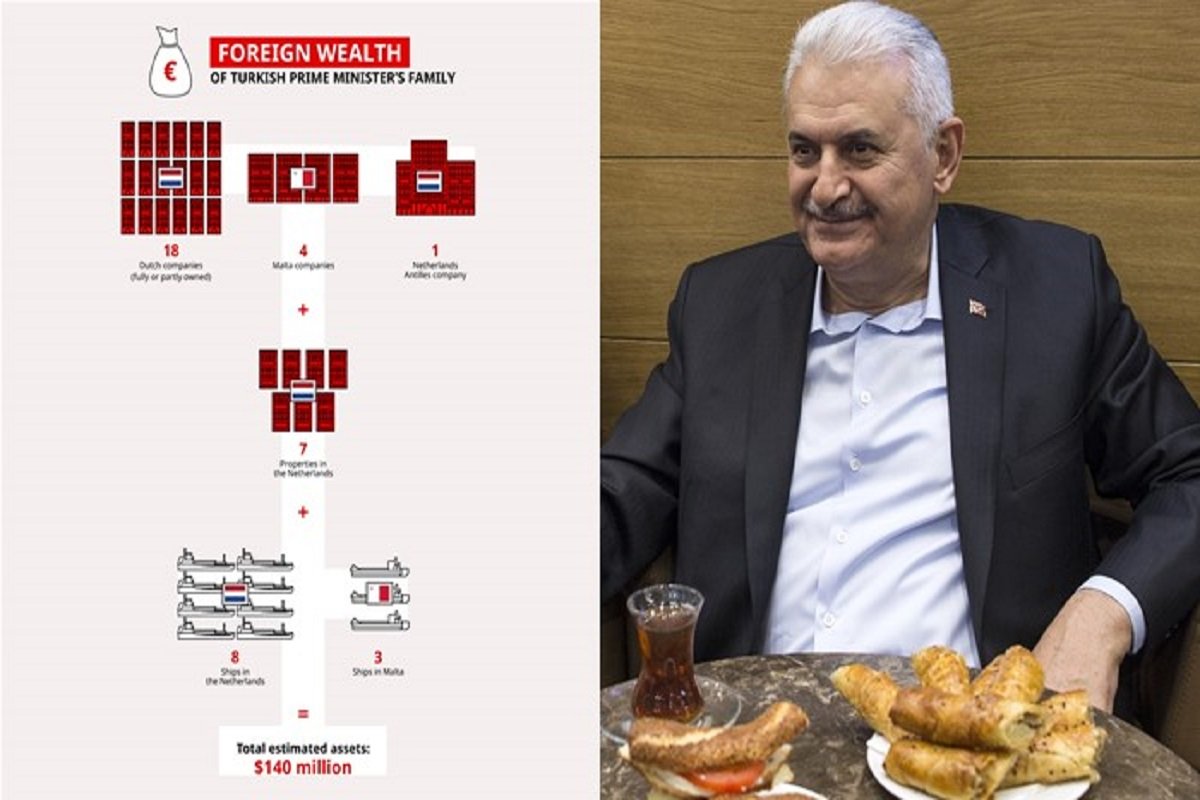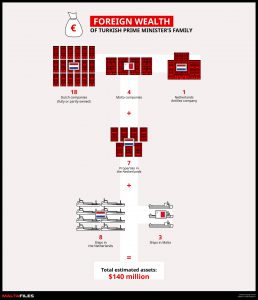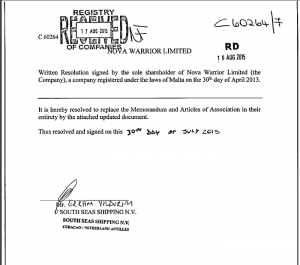
An investigation into Turkish Prime Minister Binali Yıldırım’s family enterprise, part of the European Investigative Collaborations’ (EIC) Malta Files, has revealed that his family currently possesses shipping and related assets of well over 100 million euros, according to reports on the theblacksea.eu and mediapart.fr news websites.
Yıldırım’s family enterprise consists of 11 foreign-flagged ships nested in a network of secretive companies in Malta, the Netherlands and the Netherlands Antilles — specifically now Curaçao, with more suspected in the Marshall Islands and Panama. At least four of the ships are financed with huge loans from Swiss and Turkish banks, including one part-owned by the Turkish state.
While some of the activities, especially in tax havens, remain opaque, The Black Sea website discovered that Yıldırım’s son, daughter, uncle and nephews have purchased seven properties in the Netherlands, worth over $2.5 million – all of which were paid for in cash.
The investigation also uncovered how the Yıldırıms used one of these Dutch companies to anonymously donate 600,000 euros (TL 1.75 million) to the municipality of Pendik, near İstanbul, for a lavish new mosque.

Yıldırım’s career in shipping began in 1994 when he managed the İstanbul Fast Ferries Company (İDO), owned by the city. However the İstanbul bosses fired him in 2000 over revelations that he awarded a contract to manage the ferries’ canteens to his uncle, Yılmaz Erence.
The scandal did little to harm Yıldırım’s career. Instead, he entered politics. Since 2001, he has been a key member of Turkey’s current autocratic President Recep Tayyip Erdoğan’s Justice and Development Party (AKP). When this fledgling movement won the 2002 Turkish elections, Yıldırım landed the job of minister of transport in the new government’s first-ever cabinet. He held this job, with some interruptions, for almost 12 years.
Throughout his tenure, there has been speculation in the Turkish press and among lawmakers about his family’s business. Several times, Yıldırım refused to answer questions in Parliament from opposition deputies demanding that he reveal details of how they make their money in shipping.
His only public statement is to a journalist from CNN Türk in March 2013, when he coyly explained that that he passed his shipping business to his children when he became a deputy in 2002. But he would not go into detail.
The first traces of the Yıldırıms’ offshore adventures appear in Malta in 1998, via a company that alludes to the Turkish provenance of its shareholders — Tulip Maritime Limited.
This was headed by the prime minister’s uncle Yılmaz and contacts from Turkey’s political and business world. These included Salih Zeki Çakır, a known ship-owner who employed Yıldırım briefly before his career in government, and Ahmet Ergün, President Erdoğan’s advisor from his days as İstanbul mayor, as well as a former deputy and high court judge, Abbas Gökçe.
Their first vessel was the Silver Fish, a cheap 20-year-old cargo ship, which was soon broken apart.

Since then the family’s shipping fortunes have acquired a formidable buying power. Six of the 11 ships identified by The Black Sea and EIC – worth between 1.9 million and 33 million euros – appear to have been bought without any bank loans. If so, this suggests that an enormous cache of funds exists in the Dutch operation, despite on paper being a money-losing business.
The 11 ships are owned by offshore companies in the Netherlands and Malta, countries with attractive tax benefits for the maritime industry.
In February this year, Yıldırım – as prime minister — visited Malta to sign a refugee agreement with the local government.
If he had been so inclined, he might have taken the short journey to visit the offices of Mifsud and Sons, Ltd., in the capital, Valletta, and the nearby town of St Julian’s. This firm is owned by its namesake, Simon Mifsud, and represents the Yıldırım family’s latest shipping outfits in the country, called Dertel Shipping Limited, Nova Ponza Limited, Rory Malta Limited and Nova Warrior Limited.
The Yıldırıms took over the new companies on June 9, 2016, a little over two weeks after Erdoğan appointed Yıldırım as Turkey’s prime minister.
The director of each of these is Süleyman Vural, Yıldırım’s nephew.
Inside three of these companies are three ships. These include the never-before revealed MV Shark, owned by Rory Malta Limited, the MV Ponza, by Nova Ponza Limited and the MV Frezya S, registered to Nova Warrior Limited. Two of them, worth 1.9 million and 2 million, were obtained with the help of loans from the Swiss Cornèr Bank.
Rory Malta and Nova Ponza lead to Ceren Danışmanlık Denizcilik in Turkey, a shipping business set up by uncle Yılmaz and his son, Rıfat Emrah Erence, in İstanbul, at the end of 2015.
The shareholder of Dertel – which does not own any ships — and Nova Warrior is a Dutch Caribbean offshore company called South Seas Shipping NV. On paper, it appears to be a dead end, leading to corporate law firm CMT Shipping NV, in Curaçao.
Corporate service providers such as CMT are often used as nominees by businesses and individuals wishing to hide their involvement. When the companies are in a tax havens like Curaçao, this adds an often-impenetrable layer of secrecy.
Today, Yıldırım family’s ships sail through the Med around Bari, Italy, the Greek islands and the southern coast of Spain. They are each valued at between $2 million and $3 million.
The Yıldırıms did not answer questions about South Seas Shipping.
But this is minor league compared to the family’s Dutch operation — where the assets reach over $130 million.
After Turkey’s constitutional referendum last month, which granted President Erdoğan the power to destroy the Prime Ministry in two years, Yıldırım’s tenure at the top is coming to an end.
But in the nearly 20 years since he “transferred his businesses” to his children, they have created a soft cushion for him to land upon when he leaves politics for good.
The Black Sea approached several relevant parties named in the story with unanswered questions.
PM YILDIRIM ELECTED AS AKP PARLIAMENTARY GROUP CHAIRMAN
Following the election of President Erdoğan as chairman of the ruling AKP on Sunday, Prime Minister Yıldırım was elected chairman of the AKP parliamentary group on Wednesday. Yıldırım was elected by garnering 300 deputies’ votes during a closed session of the AKP parliamentary group meeting.
Bülent Turan, vice chairman of the AKP parliamentary group, said on Tuesday that since the law does not allow President Erdoğan to become chairman of the AKP parliamentary group, the party would elect a new group chairman, and they proposed Yıldırım for the post.
Following a referendum in April that introduced an executive presidency in Turkey, President Erdoğan was elected as the new chairman of the AKP after a 998-day absence from the party during the party’s third extraordinary congress held at the Ankara Sports Hall on Sunday.
Before the election, Erdoğan reshuffled the AKP’s Central Decision and Executive Board (MKYK), with 19 members of the 50-seat board changed. Prime Minister Yıldırım, who handed over party leadership to Erdoğan, became “acting chairman” of the MKYK after an amendment to the AKP bylaws. (SCF with turkishminute.com) May 24, 2017














